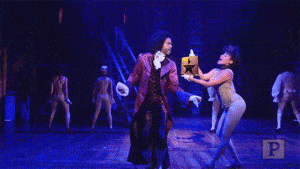By: Rahmel Bailey
Hamilton is probably the only founding father I will call a gangster. A gangster is someone who is ruthless, willing to do anything for success and doesn’t let anything get in the way of that success. Hamilton lived his life knowing death wasn’t far and made decisions to build and protect his legacy while he was alive. Much like a lot of OGs he was raised poor and without a father, he only had his mother around. The circumstances that he was born into fueled him take his shot and kill Red Coats in the revolution where he rose to fame. Shots were the same way his life ended when he was killed in a duel.
According to the code of THUG LIFE by Matulu Shakur, Hamilton unknowingly lived by some of the codes. He followed the beginning of the code because he knew he would be successful and that he would not live a long life. He was responsible for legal/ payment financial system by creating the country’s national financial system and help the nation develop credit and debt. As stated in the code, Hamilton knew true enemies that prevented him from reaching his success, this is why he had an intense feud with Burr who was his true enemy and tried to take his spot in the Washington cabinet. Hamilton followed the rule to respect brothers and sisters (not the family kind) by having respect for Washington and some of the other founding fathers even when their views weren’t aligned. And he had respect for sisters which was proven by the way he regarded his wife who spoke highly of him. Hamilton lived (actually he died) by the code to protect yourself. Whenever he was attacked by an enemy especially Burr he never backed down and was ready to take on anyone. Even when he was challenged to a duel by Burr, Hamilton didn’t back down even though he was opposed the feud. Hamilton lost his life because he was protecting himself. And more importantly, he didn’t shoot during the duel because he wasn’t to protect his reputation, which is the lasting memory of himself.
Hamilton is truly a gangster. A real OG.
















